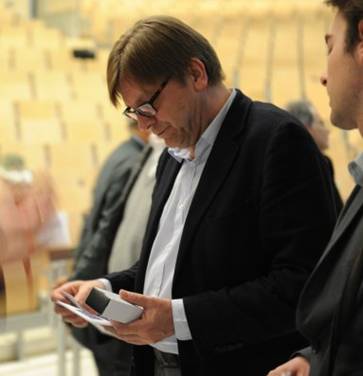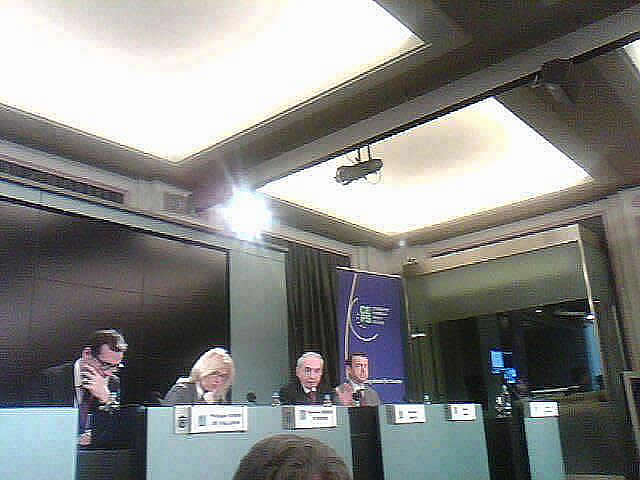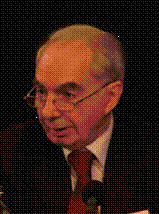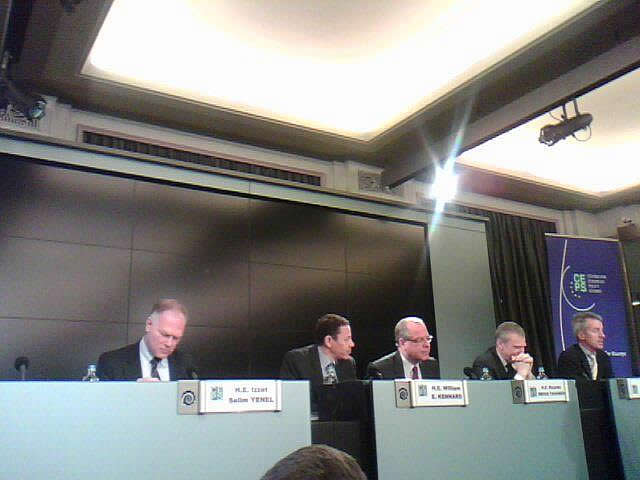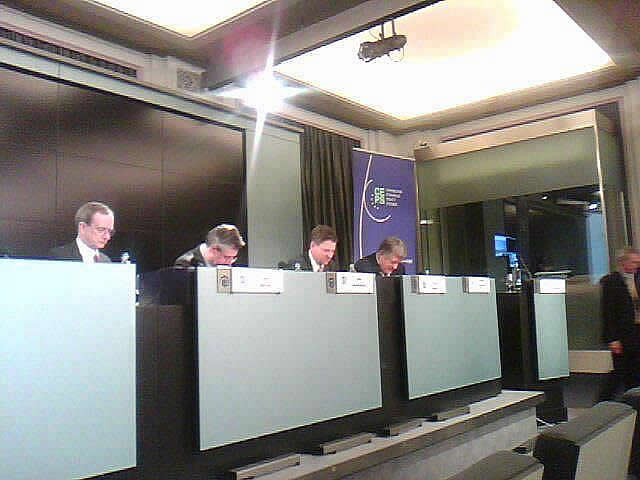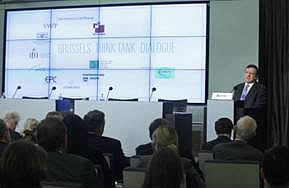 |
"To go the road of functional federalism, a democratic pooling and sharing federation of nation states, might increase the chance to lose the connection with the people" stressed President Barroso 22 April 2013 during the 4th Brussels Think Tank Dialogue, where he delivered a speech on 'State of the Union 2013 – Federalism or Fragmentation: Spelling out Europe's F-Word'.
Not a superstate, but to build with member states a United States of Europe, where a convention for the purposes of treaty changes is needed for.
|
"A half-hearted attitude towards the project of European integration only serves to strengthen its opponents," President Barroso argued, "to concede the political momentum to those on the side of nationalism and populism. Only by calling it by its name do we get a chance to debate the real issues, to make clear what is behind the word federalism.
"Rather than a threat to Member States, functional federalism as developed throughout European history is also a guarantee for subsidiarity: 'Federalism is in itself a concept with two faces: searching for unity whilst recognising, respecting and reconciling genuine autonomy. At its very core is the idea of unity in diversity. Now, what can be more European than that? "Institutionally, the EU has developed tremendously during the crisis in order to avert fragmentation. The real risk today comes from elsewhere," the President said: "I am deeply concerned about the divisions that we see emerging: political extremes and populism tearing apart the political support and the social fabric that we need to deal with the crisis; disunion emerging between the centre and the periphery of Europe; a renewed demarcation line being drawn between the North and the South of Europe; prejudices re-emerging and again dividing our citizens, sometimes national prejudices that are simply unacceptable also from an ethical point of view."
|
At the end of June 2012, the Spinelli Group presented a “Federal Act”, containing 12 elements following the outline of the 4 blocks identified by the “Towards a genuine economic and monetary union” produced by the 4 Presidents. The Spinelli group calls for a banking Union, an Economic and fiscal Union and a political union.
Not only Andrew Moravcsik was engaged in federalism in the EU, in March 2012, also the Spinelli Group by discussing federalism. Daniel Cohn-Bendit, co-chair of the Green/EFA group and one of the frontmen of the federalist Spinelli Group, called for primaries to be held one year ahead of the 2014 European elections to choose candidates for the next European Commission president. An alliance should organise a primary in 2013 to choose a candidate to succeed to José Manuel Barroso, he said. He called the alliance a "pact for social and ecological democratisation of Europe". "We don't need to ask anyone," he said, referring to other proposals aimed at giving legitimacy to the selection of Barroso's successor. Cohn-Bendit said that if the alliance would have the majority in the 2014 election, leaders of EU countries could still propose candidates, but the only candidate who could pass in Parliament would be the one chosen through primaries. The next year should create "a democratic space" in Europe, said Cohn-Bendit. He admitted that the number of voters likely to participate in the primaries would be low - between six and ten million people of an estimate 260 million. |
||
|
||
Speaking at the same event, ALDE group leader Guy Verhofstadt said the European People's Party (EPP) could also organise primary elections. But some EU countries to not have a tradition of holding primaries, he conceded. He outlined the various ideas in preparation for the 2014 elections. On the transnational lists, he said, there was "a lot of opposition also inside the European Parliament". The two largest political groups, the centre-right EPP and the centre-left S&D, reportedly oppose transnational lists.Verhofstadt said an alternative to the transnational list would be to give candidates the possibility to run in several national constituencies. The third possibility he outlined was to decide that the next Commission president would chosen from amongst the MEPs.
Regarding the need to increase the turnout at the European elections, Verhofstadt pleaded for a European tax to be paid by all EU citizens, which in his view will make them more responsible and more interested in the EU elections. |
